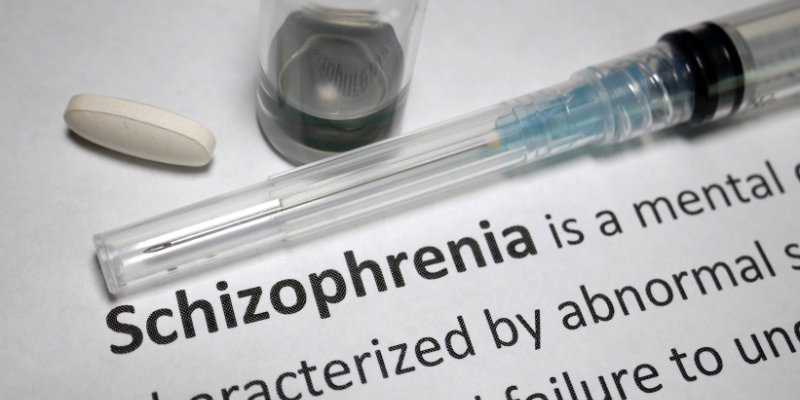Schizophrenia, a complicated mental health illness, may appear at certain life phases, posing distinct difficulties to people and their families. For appropriate intervention and sound therapy, knowing the usual age of start and early indications is essential. The signs and symptoms of schizophrenia vary with age, as this study examines them.
Childhood schizophrenia is uncommon but not impossible. Social disengagement, cognitive issues, and abnormal conduct may indicate early symptoms. These tiny symptoms might overlap with typical growth periods, making them hard to see. Hallucinations, delusions, and cognitive impairment may increase in adolescence and early adulthood, the peak onset period. Early diagnosis and support systems are vital because early intervention during these critical developmental periods might affect long-term results. Schizophrenia may develop differently in maturity and older age, sometimes with cognitive deterioration and social isolation.

What Is the Typical Age of Onset for Schizophrenia?
Schizophrenia usually develops between 16 and 30. It might start in childhood or later in adulthood. Understanding onset timings helps detect and treat symptoms at different developmental stages.
Early Signs of Schizophrenia in Children:
Childhood schizophrenia is difficult to diagnose, although early indicators include social withdrawal, developmental delays, speech problems, and interpersonal issues. You need to know age-appropriate behavior and communication to spot these indications. Caregivers and educators help identify developmental delays. Early intervention by mental health experts and educators is essential to help children with schizophrenia and enhance their long-term results. Caregivers, schools, and healthcare professionals must be informed to help afflicted children.
Early schizophrenia symptoms in children are mild and often misinterpreted as normal behavior. Speech problems may be mistaken for language development. Regular developmental examinations and open communication between caregivers, educators, and healthcare practitioners can spot issues. These stakeholders work together to analyze a child's behavior and implement early intervention measures to improve mental health.
Early Signs of Schizophrenia in Teenagers:
Schizophrenia symptoms include academic decline, social disengagement, sleep disturbances, and concentration issues throughout adolescence, a crucial time for mental health development. Symptomatic adolescents may benefit from early intervention and support. Teenage behavior and schizophrenia symptoms are difficult to distinguish. Using mental health services in schools and communicating openly may help detect and treat early indicators. Timely intervention throughout this formative period may change the disorder's course and enhance teens' well-being.
Early schizophrenia detection in teens demands a comprehensive strategy that addresses adolescent problems. Schools and mental health professionals should work together to develop awareness initiatives and include mental health education in the curriculum. Peer support and mental health services in schools may help teens with early schizophrenia.
Early Signs of Schizophrenia in Adults:
Early adulthood, when schizophrenia often appears, may worsen symptoms. Adults may have social isolation, strange beliefs, trouble organizing thinking, and vocational impairment. These indications might help you get mental health care quickly. Helping someone seek assistance requires support from family, friends, and coworkers. Public awareness initiatives may reduce stigma and encourage early action. For accurate diagnosis and individualized therapy, mental health practitioners must be alert in spotting early indications and offering complete examinations.
Mental health literacy is crucial since early schizophrenia symptoms in adults might be misread or neglected. Open discussions about mental health in businesses, communities, and families may help identify early. Employers can help by offering mental health services and supportive work environments. Early intervention improves results and makes society more caring and knowledgeable.

Early Signs of Schizophrenia in Older Adults:
While rare, schizophrenia may start in elderly age. Cognitive deterioration, social seclusion, and everyday problems may occur. These symptoms must be distinguished from other age-related illnesses for proper diagnosis and treatment. Accessing mental health treatments for older schizophrenia patients may require collaboration between healthcare practitioners, caregivers, and the community.
Understanding the effects of aging on mental health is necessary to spot schizophrenia in older adults. Family, caregivers, and doctors should be aware of cognitive and behavioral changes. Adding mental health screens to geriatric exams may improve early detection. Supportive and social programs for older adults may improve mental health and reduce schizophrenia-related social disengagement.
Schizophrenia Onset Symptoms:
Delusions:
People retain delusions despite facts, frequently against reason. These skewed beliefs might include paranoia, where people think they're being watched, or grandiosity, where they think they're essential. Schizophrenia's delusions affect thoughts and actions and complicate the condition. Understanding and treating delusions are crucial to well-being therapy.
Hallucinations:
Auditory hallucinations are the most prevalent kind. False sensory experiences may distort reality and cause suffering. Understanding hallucinations is essential to designing remedies that correct sensory abnormalities and improve perception. To reduce the effect of hallucinations on everyday life, medication, therapy, and support are commonly used.
Disorganized Speech:
Schizophrenia causes disorganized speech, making communication difficult. Incoherence, derailment, or tangentiality may make it hard for others to grasp the person's ideas and goals. Incoherent speech impairs social and vocational performance. Effective interpersonal relationships are fostered by therapeutic therapies that improve communication, cognitive processes, and coherent expression.
Disorganized Behavior:
Schizophrenia causes disorganized conduct, including erratic activities, everyday task challenges, and poor self-care. This element of the condition might make independence and ordinary tasks difficult. Treatment for disorganized behavior may include medication management, psychological therapies, and caregiver support. Managing disordered behavior and increasing functional capacities requires defined routines and daily task direction.
Conclusion:
The varying development of schizophrenia throughout life stages emphasizes the need for individualized awareness and intervention. Early detection in children, teens, adults, and older adults allows for prompt mental health assistance. Effective treatment, support, and quality of life for schizophrenia patients may be achieved with a detailed knowledge of symptoms and proactive action.
In children with odd but likely onset, parents, caregivers, and educators must be aware of subtle signs to aid with early intervention. In educational contexts, focused awareness helps adolescents navigate critical developmental stages by detecting and addressing early signs. Comprehensive mental health awareness programs and destigmatization are essential to facilitate prompt help-seeking in adults, especially in early adulthood. Healthcare workers and caregivers must recognize age-specific indicators and provide mental health assistance for older adults whose schizophrenia development is rare. Tailoring methods to each life stage helps spread awareness, leading to early intervention and better schizophrenia results.




